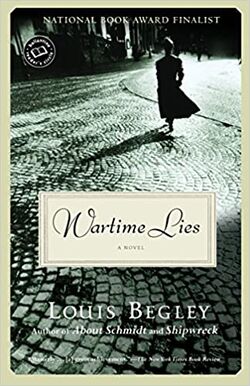Louis Begley / Ludwik Begleiter (M / Poland, 1933), Holocaust survivor
Louis Begley / Ludwik Begleiter (M / Poland, 1933), Holocaust survivor
- KEYWORDS: <Hidden Children>
- MEMOIRS : Wartime Lies (novel, 1991)
Biography
Begley was born Ludwik Begleiter in Stryi, then part of the Polish Republic and now in Ukraine, the only child of a physician.[1] Using forged identity papers that enabled them to pretend to be Polish Catholics, he and his mother survived the almost wholly successful German attempt to kill all Polish Jews.
He lived with his mother at first in Lwów, and then in Warsaw until the end of the August 1944 Warsaw uprising. By the time World War II ended, they were in Kraków, where they were reunited with Begley’s father.
The family left Poland in the fall of 1946 for Paris and, in late February 1947, left Paris for New York City, arriving on March 3. Shortly afterward, the family name was changed from Begleiter to Begley.
In 1956 Begley entered Harvard Law School. He had a successful career as a lawyer and a novelist.
Book : Wartime Lies (novel, 1991)
- Louis Begley, Wartime Lies: A Novel (Knopf, 1991).
This semi-autobiographical novel, set in Poland during the years of the Nazi occupation, is about two members of an upper middle class Jewish family, a young woman (Tania) and her nephew (Maciek), who elude arrest by getting Aryan papers and assuming Catholic identities. Time and again the boy, who narrates the story from some remote point in time, reminisces about how he learned at an early age to lie in order to survive. Thus, his whole adult life is founded on the "wartime lies" of his childhood.
"Extraordinary...Rich in irony and regret...[the] people and settings are vividly realized and his prose [is] compelling in its simplicity."(THE WALL STREET JOURNAL) ... As the world slips into the throes of war in 1939, young Maciek's once closetted existence outside Warsaw is no more. When Warsaw falls, Maciek escapes with his aunt Tania. Together they endure the war, running, hiding, changing their names, forging documents to secure their temporary lives—as the insistent drum of the Nazi march moves ever closer to them and to their secret wartime lies."--Publisher description.

